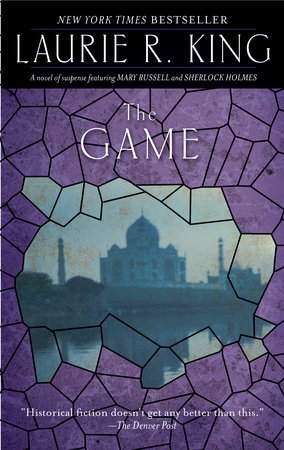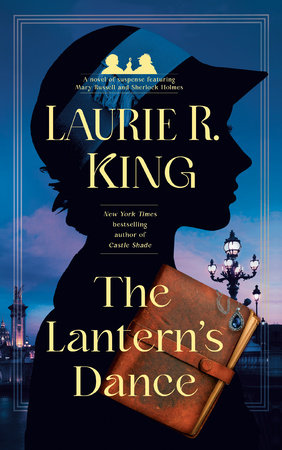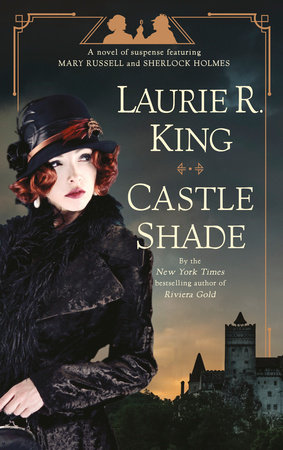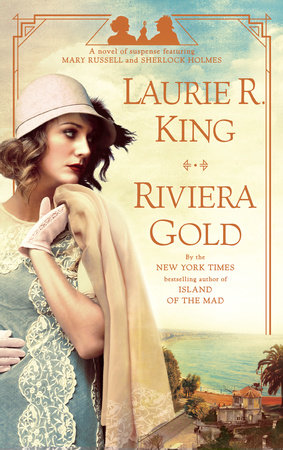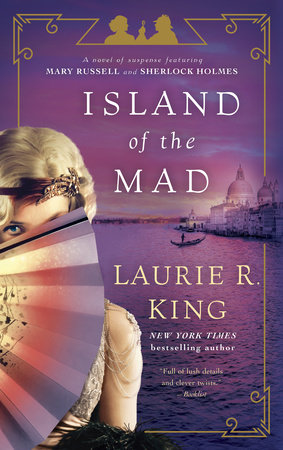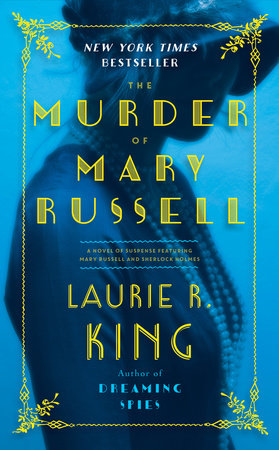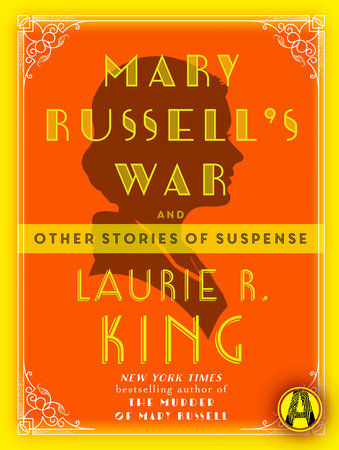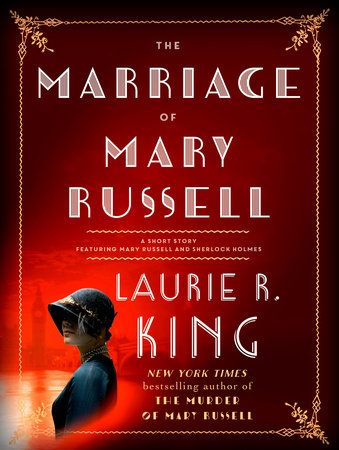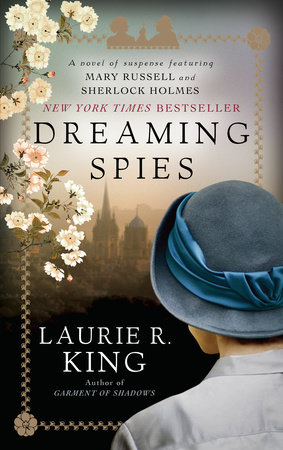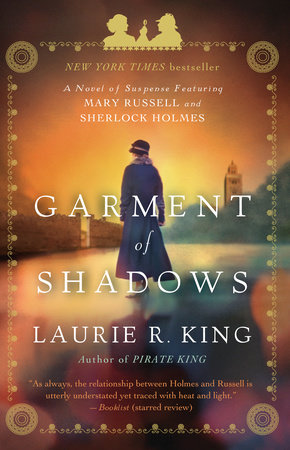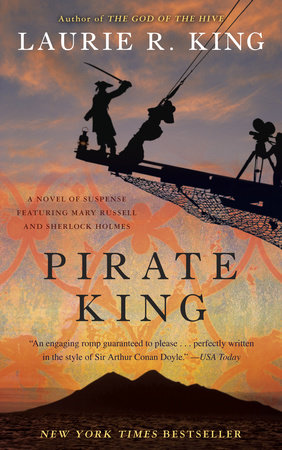Excerpt
The Game
Chapter One
Travel broadens, they say. My personal experience has been that, in the short term at any rate, it merely flattens, aiming its steam-roller of deadlines and details straight at one's daily life, leaving a person flat and gasping at its passage.
On the first of January, 1924, I was enjoying a peaceful New Year's evening with my partner and husband, Sherlock Holmes, in our snug stone house on the Sussex Downs, blissfully unaware that scarcely forty hours later I would be sprinting desperately for a train across a snow-covered railway siding. But on the first day of the new year, I was at peace and I was at home, with a full stomach, a tipsy head, and—most pleasant of all—warm feet. No fewer than three bottles of wine stood on the sideboard, in various stages of depletion. Holmes had just taken a connoisseur's sip of the last to appear in our glasses, a dusty port twice as old as I. He sighed in satisfaction and stretched his slippers out to the fire.
"It is good to find that the French vineyards are recovering from the War," he noted, although of the three wines, only the champagne had gone into its bottle since 1918.
I agreed, rather absently I will admit. As I took a swallow of the glorious liquid, it occurred to me that some part of the back of my mind was braced for a ring of the telephone or a furious pounding on the door. The visceral mistrust of leisure was perhaps understandable: Twice in the past six months the outside world had crashed in on us; indeed, we had been similarly seated before the fire one evening a scant two months earlier when an investigation literally fell into our arms, in the form of an old friend with a bloodied head. It was not yet midnight, and I had no faith in our stout oaken door to keep out surprises of the kind Holmes tended to attract.
However, pleasantly enough, no pounding fist came to trouble our companionship or, later, our slumber, and we rose early the next morning, fortified ourselves with one of Mrs. Hudson's hearty breakfasts (this one even more elaborate than usual, to make up for her being cheated of preparing the dinner for this, my twenty-fourth birthday), and bundled into our warmest clothes for the sleet-drenched trip to London. We rode the train in silence, taken up with our thoughts and with the newspapers, both as cheerless as the landscape outside the windows. Foot-and-mouth disease, the rising Seine, and doomsayers with apocalyptic predictions on both sides of the Atlantic, set off by the recent Labour victory.
Grimmer yet was the real reason for our visit to the great city. We had no end of business there, of course, from a long-delayed appointment with the bank manager to calling on a noble family in order to follow up on our most recently concluded investigation, but in truth, we were there to see Holmes' brother Mycroft, whose health was giving, as the euphemism goes, cause for concern.
He was home from hospital already, although the doctors had strongly advised against it, and embarked on his own programme of therapy. I personally wouldn't have thought a near-starvation diet of meat and red wine combined with long hours of vigorous calisthenics would be the best thing for a shaky heart, but not even Holmes' arguments made much of an inroad on Mycroft's determination. We had maintained a closer contact with him than usual over the past week and a half, none of us voicing the thought that each visit could well be our last. We hurried through the day's business, I listening with half an ear to the urgent recitation of calamity that trembled over the head of my American possessions, thinking only that, affection for my father or not, the time had come to rid myself of his once-cherished properties across the sea. I kept glancing at my wrist-watch, until finally with a sigh my solicitor threw up metaphorical hands, gave me the papers that required my signature, and allowed me to escape.
When we arrived at Mycroft's door, however, I had to admit that his self-prescribed fitness regime did not seem to be doing him any harm. He was up and around, and if he opened the door in his slippers and dressing-gown, he moved without hesitation and had colour in his face. There was also nearly a stone less of him than there had been on Christmas Day, which made his jowls flaccid and his eyes more hooded than usual.
"Many happy returns of the day, Mary," he said, and to Holmes, "I believe you'll find a corkscrew on the tray, if you'd be so kind." After toasts came the inevitable discussion of the impending disaster that the new Labour government was certain to bring in. Predictions were rife, that the institution of marriage was sure to be done away with, that rubles would replace the pound sterling, the Boy Scouts and the monarchy would be abolished, the House of Lords sold for housing flats—everything short of plagues and rains of frogs. There were strong rumours that the Prime Minister would refuse to step down to Labour's minority vote, thus igniting a constitutional crisis if not outright revolution; the newspapers that morning had mentioned the concern of America, politeness thinly concealing Washington's growing alarm. When I said something of the sort, Mycroft nodded.
"Yes, the Americans are becoming increasingly nervous about the Reds. They seem to envision a Socialist state that stretches from London to Peking, and don't know whether to be more worried about the Bolsheviks succeeding, or about the chaos that will follow if they fail."
When we had exhausted the various topics, we sat down to a meal only marginally less sumptuous than one of Mycroft's usual, accompanied by what passed for small talk and polite conversation in the Holmes household, in this case an interesting development in forensic science from America and a nice murder that was baffling the authorities. Dessert was a small decorated cake, which none of us ate.
The pouring of coffee, offer of brandy, and fingering of cigars indicated that the meal was finished, business could be resumed. The talk circled back through the Labour victory and the huge problems facing a minority government, before Mycroft took a last, ritual mouthful from his cup, put it onto the table, and asked, "Have you been following the news from Russia?"
My head snapped up as if he'd hauled back on my reins—which in a way, he had: I knew him far too well to think his question innocent. "No!" I said sharply, before things could edge one syllable further down that slippery slope. "I absolutely refuse to go to Moscow in January."
He made a show of shifting feebly in his chair, letting out a quiet sigh of infirmity before he looked up. "I said nothing about Moscow."
"Siberia, then. Some place either deadly or freezing, or both."
He abandoned the attempt at innocence. "I would go myself," he tried, but at my disbelieving snort and Holmes' raised eyebrow, he dropped that as well. All the world knew that Mycroft Holmes went nowhere outside his tightly worked circle if he could possibly avoid it: Dr Watson had once referred to Mycroft's unexpected appearance in their Baker Street flat as akin to finding a tram-car running down a country lane.
It did, however, answer a question that had been in the back of my mind ever since the general election, namely, how would the radical change in government affect Mycroft? Mycroft's role in the outgoing Tory government was as undefined as it was enormous; it seemed he intended to simply ignore the shuffling of office-holders all around him.
"What has happened, Mycroft?" Holmes asked, drawing my attention back to the until-now overlooked fact that, if Mycroft, in his condition, had been consulted on a matter by whichever government, it had to have struck someone as serious indeed.
By way of answer, the big man reached inside the folds of his voluminous silken dressing-gown and pulled out a flat, oilskin-wrapped packet about three inches square. He put it onto the linen cloth and pushed it across the table in our direction. "This came into my hands ten hours ago."
Holmes retrieved the grimy object, turned it over, and began to pick apart the careful tucks. The oilskin had clearly been folded in on itself for some time, but parted easily, revealing a smaller object, a leather packet long permeated by sweat, age, and what appeared to be blood. This seemed to have been sewn shut at least two or three times in its life. The most recent black threads had been cut fairly recently, to judge by their looseness; no doubt that explained the easy parting of the oilskin cover. Holmes continued unfolding the leather.
Inside lay three much-folded documents, so old the edges were worn soft, their outside segments stained dark by long contact with the leather. I screwed up my face in anticipation of catastrophe as Holmes began to unfold the first one, but the seams did not actually part, not completely at any rate. He eased the page open, placing a clean tea-spoon at its head and an unused knife at its foot to keep it flat, and slid it over for me to examine as he set to work on the second.
The stained document before me seemed to be a soldier's clearance certificate, and although the name, along with most of the words, was almost completely obscured by time and salt, it looked to belong to a K-something O'Meara, or O'Mara. The date was unreadable, and could as easily have been the 1700s as the past century—assuming they issued clearance certificates in the 1700s. I turned without much hope to the second document. This was on parchment, and although it appeared even older than the first and had been refolded no less than four times into different shapes, it had been in the center position inside the leather pouch, and was not as badly stained. It concerned the same soldier, whose last name now appeared to be O'Hara, and represented his original enlistment. I could feel Mycroft's eyes on me, but I was no more enlightened than I had been by the certificate representing this unknown Irishman's departure from Her Majesty's service.
Holmes had the third document unfolded, using the care he might have given a first-century papyrus. He made no attempt to weigh down the edges of this one, merely let the soft, crude paper rest where it would lest it dissolve into a heap of jigsaw squares along the scored folds. I craned my head to see the words; Holmes, however, just glanced at the pages, seeming to lose interest as soon as he had freed them. He sat aside and let me look to my heart's content.
This was a birth certificate, for a child born in some place called Ferozepore in the year 1875. His father's name clarified the difficulties of the K-something from the other forms: Kimball.
I looked up, hoping for an explanation, only to find both sets of grey Holmes eyes locked expectantly onto me. How long, I wondered, before I stopped feeling like some slow student facing her disappointed headmistress? "I'm sorry," I began, and then I paused, my mind catching at last on a faint sense of familiarity: Kimball. And O'Hara. Add to that a town that could only be in India. . . . No; oh, no—the book was just a children's adventure tale. "I'm sorry," I repeated, only where before it had connoted apology, this time it was tinged with outrage. "This doesn't have anything to do with Kim, does it? The Kipling book?"
"You've read it?" Mycroft asked.
"Of course I've read it."
"Good, that saves some explaining. I believe this to be his amulet case."
"He's real, then? Kipling's boy?"
"As real as I am," said Sherlock Holmes. "And yes, this is his amulet. I recognize it."
"You know him?" I don't know why this revelation startled me as if he'd claimed to have met a hippogryph; heavens, half the world considered Holmes fictional. But startle me it did.
"I knew him, long ago. We spent the better part of a year in each other's company."
"When?"
He smiled to himself. "While I was dead."
I knew my husband and partner was not referring to some spiritualist experience of a previous lifetime. "When I was dead" was his whimsical term for the period beginning in the spring of 1891, when he disappeared at Switzerland's Reichenbach Falls, and for three years wandered the globe, returning to London only when a mysterious murder called him back to the land of the living. Knowing that Mycroft had preserved his Baker Street rooms for him during those three years, and knowing what Mycroft was, I had no doubt that at least a portion of that time, Holmes had been about the Queen's business. Still, I had never heard the details.
I was not to hear them now, either. Holmes had already turned to his brother, and was asking, "How did these come to you?"
"Through the hands of a certain captain who has an interest in both worlds."
"Not Creighton?"
"The man who currently holds the same position that Creighton did then, fellow by the name of Nesbit."
"And the story that accompanied them?"
"So tenuous as to be nonexistent. An Afghan trader brings a rumour that a light-skinned native man is being held by a hill raja. Six months later, a camel caravan modifies the story, that the man was being held but took ill and died, asking that these, his last effects, be returned to his people. We did trace the amulet's arrival to such a caravan, but no man could say who had carried it south, or whence it came."
Holmes nodded, but said only, "I find it difficult to imagine that particular individual being held against his will."
I broke in, with a request I did not think unreasonable, particularly as we seemed to be on the edge of being dragged into a case involving Kimball O'Hara. "I'd appreciate a little background information, just a few details about what you were doing when you knew the boy."
Holmes glanced sideways at his brother, assessing his condition, then suggested, "Perhaps it would be best if we saved the tale for a later time."
I started to protest, then decided that Mycroft's colour was indeed not peak, and brought my curiosity under control, allowing them to continue.
Mycroft answered, "As you say, it takes some doing to imagine O'Hara in custody for more than a few days. He was—how did you put it to me? 'Wily as a mongoose, slippery as a cobra, more deadly than
either.' "
"If not in custody, then what?"
"The Bear is awakening."
" 'The Bear,' " I said. "You mean Russia? But I thought our relations with them had settled down—don't we even have a trade agreement now with the Bolsheviks?"


